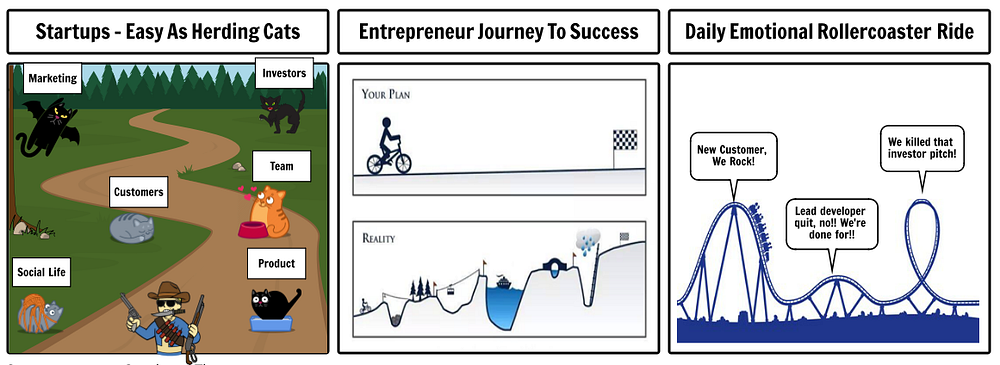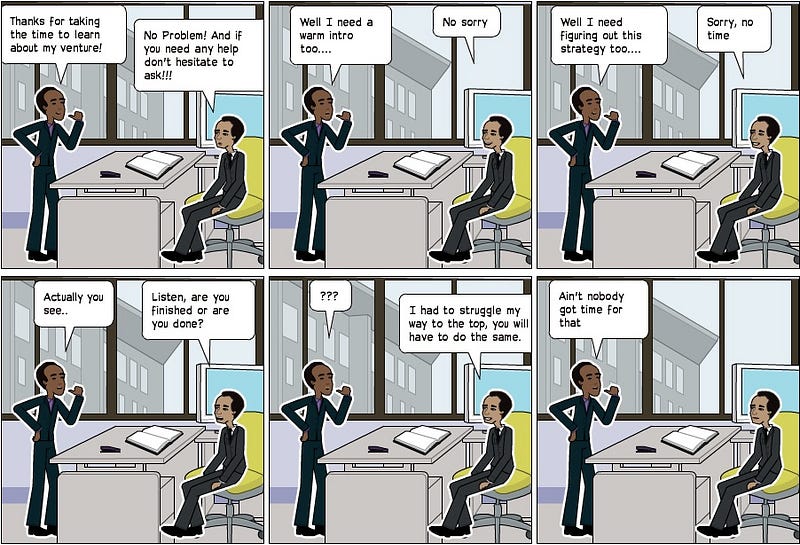The Changing Faces & Mindset of Black Entrepreneurship

For the first time ever, someone besides my father gave me money do something. It was not just anyone either, it was the CEO of Y-Combinator Michael Seibel. The money is being used towards empowering Black Entrepreneurs in a monthly group I am organizing, but his contribution represents something fundamentally important that is hard to obtain — empowerment.
Starting a successful venture is a complex undertaking that requires more than just the idea, but a good team, a strong network, strategy, capital and other important attributes. Black Entrepreneurs face a greater challenge because of their lack of access to people, education, opportunity, and capital. But the next generation of untapped founders are coming together in a unique way that will allow them to break past these barriers, and be more successful.
Entrepreneurship Is Hard
We first have to acknowledge that for anyone starting a venture, Entrepreneurship is hard.

Execution Challenges: The difficulty comes from a multitude of reasons ranging figuring out what your business is first, creating a compelling vision, access to needed capital and resources for growth, developing and scaling sales/marketing processes, correctly supporting your customers and many more areas around execution. There is no ‘how-to’ guide, you have to figure all of it out.
People Challenges: It is also hard because Entrepreneurship is a people first endeavor that requires a support system to push you forward in the right direction. First is the team, where the right people must come together and execute. The wrong team members or losing members can be devastating to a venture. I have talked about building a peripheral team which consists of advisors, mentors and board members. Lastly, the most important group of people that will decide that fate of any business is the customers or users. Bringing all these people together toward a common goal is not easy.
Emotional Rollercoaster: The emotional highs and lows of Entrepreneurship is nothing to play with. You wake up at 7 am feeling like you’re going to change an entire Industry. 10 am you get the dreaded ‘no’ from the potential investors and you imagine yourself going broke. 1 pm you land that big client and you’re back to feeling like Superman. This cycle is up and down all time when running a new business, and the effects of depression and the highs are not discussed enough.
When you combine execution, people and emotional requirements of a startup, being an employee is so much easier.
Why Black Entrepreneurship Is Harder
I have been an Entrepreneur since before I was 18. I start businesses because I enjoy the challenge, I love innovating, I believe in creating a positive impact on the world around me. My path to where I am now has been a long one, with lessons learned the hard way because of minimal guidance. For many black Entrepreneurs like myself, the path is harder because of my lack of network, education, and even deliberate roadblocks that make being successful more difficult.
Deliberate Roadblocks: Starting with deliberate roadblocks, following my network you will find I have actively helped many people with their startups because I empathize with their struggle and lack of guidance available. When I have expressed this to certain black leaders, I’ve been advised not to give my time and focus on myself, not to write articles like this one from a black perspective, and even have a white male be the face of the company. While these leaders deserve acknowledgment and accolades for the positive impact they have in the areas they focus on, I’ve realized their ideologies contribute to the problem of “black people don’t work together”. If these are black leaders saying this, that makes me curious to what happens behind closed doors in other sectors. I am NOT saying everyone is racist or will deny you because you’re black, but a Donald Trump rally will prove racism does still exist just like systemic oppression such as redlining existed in 1940’s. Point being, there is a deliberate lack of empowerment and part of it stems from our own culture.
Systemic Reasons: The history of systemic oppression makes it harder for blacks to be Entrepreneurs. For example, I’ve noticed black entrepreneurs are more risk averse than counterparts from other races. After discussing this with Black VCs who also noted this pattern, one of the reasons for this behavior is lack of a safety net. As an example, I went to college in the south, and many of the Black students were the first generation in their family to have the opportunity to attend college. Obtaining a college degree has been proven to have a direct correlation with wealth, and being the first generation they do not have a wealthy family to leverage for a risky venture. It’s also harder to leave a job when unconscious biases may make it harder to go back to work if the venture fails. There are more examples but the takeaway is past systemic oppression, even if no longer in effect, has lingering consequences within the black community that make it harder to jump into a risky venture.
Network: Remember Entrepreneurship is a people first process, and the third area that makes it harder for black entrepreneurs to succeed is their network. Going back to the college aspect, the school you attend is important not only for education but for the network and access to people. Many of fastest growing and successful companies have access to execs at top companies like Google and Facebook, who without coincidence serve as board members, advisors or initial investors to these startups. These top execs have strong ties to the top schools such as Stanford or Harvard. Given that top schools tend to only have about a 5% black population, we have less access to powerful networks.
Instead of rehashing the issues again, the next step is proactively taking steps to solve them.
The Black Entrepreneurship Empowerment Group
Life is full of problems and people deal with it in different ways. Some choose to endure problems in silence, other are vocal to raise and awareness, and there is a minority of people that choose to act. What I seek is to bring together a group of people focused on action.

The black engineering group /dev/color started by Makinde Adeagbo was the single most impactful influence for organizing the mastermind group. /dev/color has a culture that is about people helping each other, and it gamifies helping with a system called props. When someone helps you, you give them props that are recorded and broadcasted. Being in this culture where people routinely help each other without asking “what’s in it for me” is the first time I’ve felt like I’ve had a support system that can I can depend on to help me move forward.
StealthMode, another professional group, was also very impactful. In StealthMode they have a great forum where I can post looking for help and people will respond with solutions. I learned that is was actually ok to ask for help, and the act of getting help when asked was both unfamiliar but positive.
As an Entrepreneur, one of your top jobs is building your network. Building a business involves many people, its similar to the saying “it takes a village to raise a child”. What would happen if we could bring these networks we are actively building together and share relevant contacts with each other, and help one another think through our business problems? What if the culture ignored the past and focused on creating a better future with a give first mindset? That is the vision I want to create with this group, where people actively try to empower each other through connections, education and potentially capital.
Last month we had the first meetup in which 8 Entrepreneurs showed up, and everyone left with value in how to move forward with their business. This month we’ve had close to 50 RSVPs and growing excitement.
The Impact Of Seibel’s Contribution
To this endeavor, Michael Seibel made a monetary impact towards the food which speaks volumes. From a perspective of an Entrepreneur who has started several businesses, some spanning across several states, hundreds of clients and tens of thousands of users, I have never been given capital. As a founder, I began to question if everything I was doing was an exercise in futility that would hit a glass ceiling. Considering only about 1% venture capital goes to Black and Latino founders, it’s felt across the industry.
A contribution like his symbolizes that there is not only support in the community but potential capital available. For me personally, it’s not only empowering but also motivating to try and impact as many people as possible. I can see a path that will help my startup get off the ground and grow to the scale that I want.
That is the vision and feeling I want to create with this monthly group of black Entrepreneurs. An ecosystem of blacks from diverse backgrounds in terms of schooling, career, and skillsets that have two things in common: They are all Entrepreneurs and they all have the ‘give first mindset’ in helping each other succeed.



